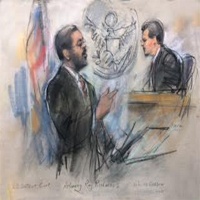Warren RICO Act Lawyer, Michigan, page 5
Sponsored Law Firm
-
 x
x

Click For More Info:
-
Richards & Associates, PLLC
200 East Big Beaver Road Troy, MI 48083» view mapCriminal Defense Accomplished Criminal Defense Attorney
If you face criminal charges, you deserve an experienced defense lawyer who has a reputation for winning the tough cases.
800-844-5250
Not enough matches for Warren RICO Act lawyer.
Below are all Warren Criminal lawyers.
Ray E. Richards, II
Criminal, DUI-DWI, RICO Act, Felony, Personal Injury
Status: In Good Standing *Status is reviewed annually. For latest information visit here Licensed: 28 Years
FREE CONSULTATION
CONTACTMarc E. Hart
RICO Act, Felony, Criminal
Status: In Good Standing *Status is reviewed annually. For latest information visit here Licensed: 41 Years
John C. Elkhoury
Landlord-Tenant, Traffic, Trusts, Criminal, Civil Rights
Status: In Good Standing *Status is reviewed annually. For latest information visit here Licensed: 14 Years
Thomas R. Everett
Criminal
Status: In Good Standing *Status is reviewed annually. For latest information visit here Licensed: 52 Years
Timothy Thomas Doty
Criminal
Status: In Good Standing *Status is reviewed annually. For latest information visit here Licensed: 14 Years
Robert A. Binkowski
Other, Government, Criminal
Status: In Good Standing *Status is reviewed annually. For latest information visit here Licensed: 52 Years
Robert R. Gray
Divorce & Family Law, Criminal, Children's Rights
Status: In Good Standing *Status is reviewed annually. For latest information visit here Licensed: 57 Years
Randy Babi
Family Law, Criminal
Status: In Good Standing *Status is reviewed annually. For latest information visit here Licensed: 9 Years
Jeffrey A. Hoag
Divorce, Divorce & Family Law, Criminal, Bankruptcy & Debt
Status: In Good Standing *Status is reviewed annually. For latest information visit here Licensed: 29 Years
Brian David Huelsman
Family Law, Divorce & Family Law, Criminal
Status: In Good Standing *Status is reviewed annually. For latest information visit here Licensed: 34 Years
 Ray Richards Troy, MI
Ray Richards Troy, MI AboutRichards & Associates, PLLC
AboutRichards & Associates, PLLC Practice AreasSpecializations
Practice AreasSpecializations